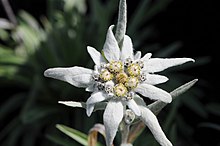EDELWEISS
| Edelweiss | |
|---|---|
 |
|
| Scientific classification | |
| Kingdom: | Plantae |
| (unranked): | Angiosperms |
| (unranked): | Eudicots |
| (unranked): | Asterids |
| Order: | Asterales |
| Family: | Asteraceae |
| Tribe: | Gnaphalieae |
| Genus: | Leontopodium |
| Species: | L. alpinum |
| Binomial name | |
|
Leontopodium alpinum , 1822 |
|
Leontopodium alpinum, commonly called edelweiss (English pronunciation ![]() i/ˈeɪdəlvaɪs/), is a well-known mountain flower, belonging to the Asteraceae (the daisy or sunflower family).
i/ˈeɪdəlvaɪs/), is a well-known mountain flower, belonging to the Asteraceae (the daisy or sunflower family).
The plant prefers rocky limestone places at about 1,800–3,000 metres (5,900–9,800 ft) altitude. It is non-toxic, and has been used traditionally in folk medicine as a remedy against abdominal and respiratory diseases. The dense hair appears to be an adaptation to high altitudes, protecting the plant from cold, aridity and ultraviolet radiation. As a scarce, short-lived flower found in remote mountain areas, the plant has been used as a symbol for alpinism, for rugged beauty and purity associated with the Alps and Carpathians, and as a national symbol especially of Austria, Switzerland, Bulgaria and Romania. According to folk tradition, giving this flower to a loved one is a promise of dedication.
...
Wikipedia
